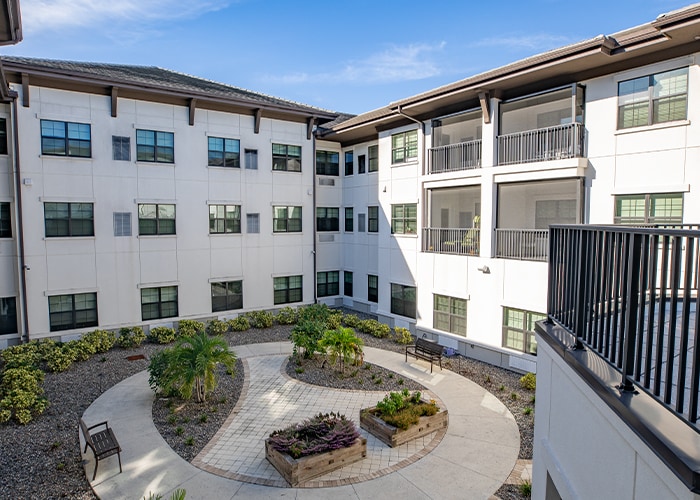When a parent is diagnosed with dementia, it can be a challenging and emotional experience for the entire family. Dementia not only affects a person’s memory, but it can also alter their personality and behaviors, making it difficult to know how to provide the best care.
Fortunately, you can navigate this complex and sensitive situation by using effective communication strategies, by showing compassion for your parent, and by asking for additional help when you need it.
In fact, you may have more options for assistance than you think in the form of memory care. Professional care offered by senior living communities can provide your loved one with the specialized support that they need.
What is Dementia?
Dementia is an umbrella term for a range of cognitive conditions, the most common of which is Alzheimer’s disease. Dementia involves a decline in mental abilities—such as memory, thinking, and reasoning—that interferes with daily life. Although dementia is often associated with aging, it is not a normal part of the aging process.
Symptoms can vary from person to person but often include forgetfulness, confusion, difficulty finding words, and changing behaviors. Early detection and diagnosis are critical in planning for appropriate care and support.
How Does Dementia Change Someone’s Personality?
One of the most distressing aspects for family members is how dementia can alter a loved one’s personality. Your once warm, caring, or independent parent may now seem confused, anxious, or irritable. These personality changes often result from the deterioration of brain regions responsible for behavior and emotions.
Understanding that changes in their parent’s personality are likely a consequence of dementia can help caregivers feel more empathetic towards changing behavior. In fact, it’s essential that caregivers approach such shifts in personality with patience and compassion.
Tips for Dealing With Parents With Dementia
Caring for a parent with dementia requires adaptability, understanding, and self-care. Here are some practical tips to help you manage the caregiving experience.
1. Improve Communication Skills
Clear and compassionate communication is key when caring for someone with dementia. Simple but effective practices include:
- Speaking slowly and clearly in a calm tone of voice.
- Using short sentences and focusing on one idea at a time.
- Maintaining eye contact to provide reassurance.
- Avoiding correcting or arguing with them over small details.
- Validating their feelings.
2. Be Flexible & Compassionate
Realize that your parent’s behavior may change daily, and be ready to adapt accordingly. If they refuse to eat breakfast now but want it an hour later, that’s okay. Show understanding and kindness, even when their actions frustrate or confuse you. Remind yourself that they’re not being intentionally difficult.
3. Notice & Manage Your Frustration
Caring for someone with dementia can be emotionally draining. If you find yourself becoming frustrated:
- Take a deep breath to regain your composure.
- Step away for a short break.
- Remind yourself that their behavior stems from their condition, not malice.
Being mindful of your emotions can prevent tension and help maintain a more positive caregiving environment.
4. Allow Others to Help
You cannot pour from an empty cup. Lean on others for support, whether that’s other family members, friends, or professional in-home caregivers. Asking for help is not a sign of weakness—it’s essential for your well-being and your parent’s care.
5. Appreciate the Small Moments
Look for moments of joy where you can connect with your parent. Whether sharing a laugh, looking through old photos, or engaging in a familiar hobby, these small interactions can help preserve your bond and comfort both of you.
Tips for Communicating With a Person With Dementia

Effective communication can go a long way in easing the frustration and confusion that often accompany dementia. Here are some additional tips to consider:
- Use Nonverbal Cues: Smiles, gentle touches, and nods can convey warmth and understanding.
- Offer Choices: Instead of open-ended questions, provide two simple options (e.g., “Would you like tea or coffee?”).
- Redirect Instead of Correcting: If your parent believes something that’s untrue, gently steer the conversation elsewhere rather than correcting them, which may cause distress.
Your tone of voice, body language, and willingness to listen make a substantial difference in how these conversations unfold.
Support for Caregivers
Caring for a parent with dementia can be rewarding, but it’s also challenging. Over time, caregiving duties can take an emotional and physical toll if you’re not careful to care for yourself.
- Join Support Groups: Connecting with others in similar situations can feel immensely validating and provide helpful advice. Online and local support groups are often available.
- Practice Self-Care: Make time for activities you enjoy, and remember that it’s okay to relax and recharge without feeling guilty.
- Seek Professional Support: If caregiving feels overwhelming, contacting a social worker, therapist, or counselor can help you process and manage the emotional burden.
Remember, it’s okay to prioritize your health and happiness. A well-supported caregiver is better equipped to provide the best support for their parent.
How Memory Care Supports Those With Dementia & Their Families
At some point, caregiving responsibilities may exceed what family members can provide. This is where professional memory care communities offer invaluable help.
Memory care communities are designed specifically for individuals with Alzheimer’s and other types of dementia. These communities provide:
- Safe, structured environments tailored to their needs.
- Trained staff to support their medical, emotional, and daily living requirements.
- Therapeutic activities aimed at stimulating cognitive function and enhancing quality of life.
Memory care services offer families peace of mind, knowing their loved one receives expert, compassionate care. This can also alleviate burnout and allow family members to focus on spending meaningful time together, free of caregiving stress.
Caring for a Parent With Dementia Is a Journey, Not a Destination
Caring for a parent with dementia is undoubtedly a challenging path, but it’s also an opportunity for immense growth, patience, and love.
At Seascape at Naples, we have extensive experience in implementing the strategies discussed above to help seniors living with dementia live safe and comfortable lives while preserving their dignity and well-being. Contact us today to see how we can help your parent lead a fulfilling life while supporting your family every step of the way.


























